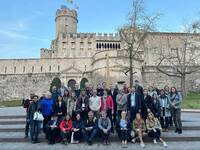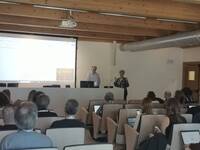From March 18th to 22nd, 50 scientists from across Europe gathered at the Fondazione Mach in San Michele to discuss new approaches to detecting bioaerosols, the biological component of atmospheric particulate matter potentially harmful to humans and plants.
This event marks the final meeting of the COST Action ADOPT "New Approaches in Detection of Pathogens and Aeroallergens," organized by the Environmental Botany Unit of the Research and Innovation Center FEM. The COST Action CA18226 involves over 140 experts from various research sectors studying bioaerosols.
Bioaerosols consist of particles such as spores of plant pathogenic fungi from cultivated and wild plants, as well as aeroallergens (primarily pollen), posing a potential risk to human health. Hence the need to sample and measure bioaerosols dispersed in the air using suitable techniques.
Innovative analysis approaches are the focus of the ADOPT Action, including real-time techniques, molecular biology, aerosol physics, and low-cost solutions. The integration and comparability of methods and data obtained through different approaches are also within the scope of CA18226.
The COST Program (European Cooperation in Science and Technology) is supported by the European Commission under Horizon Europe, fostering the creation of interdisciplinary research and innovation networks called COST Actions.
The Environmental Botany Research Unit of the FEM Research and Innovation Center has been studying airborne biological particulate matter, particularly pollen and fungal spores, since 1989, assessing the effects of climate change and implications for human and plant health. The focus on technological innovation has enabled the group's researchers to engage internationally and develop new collaborations with researchers working on similar issues and included in this extensive European network.



